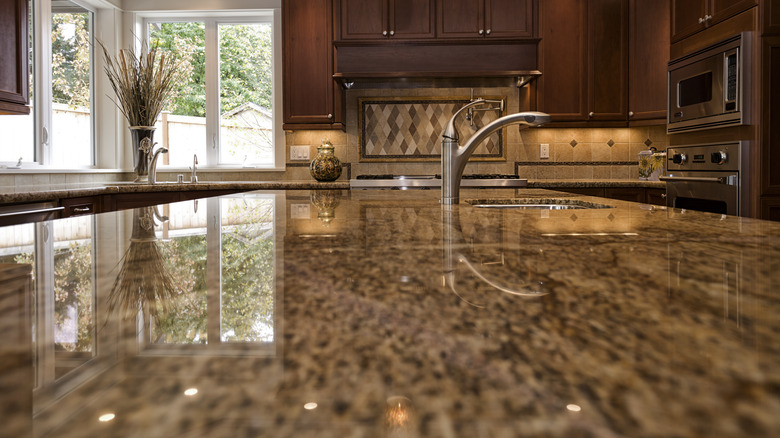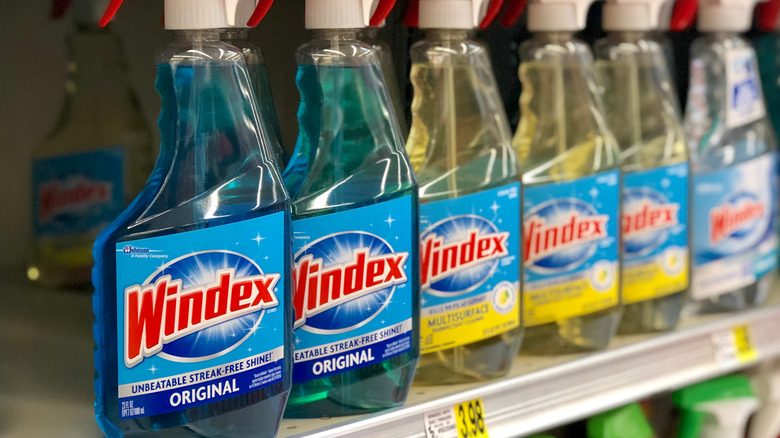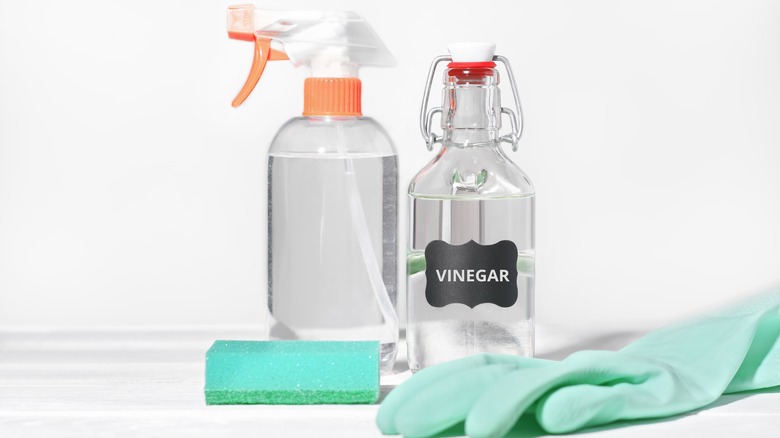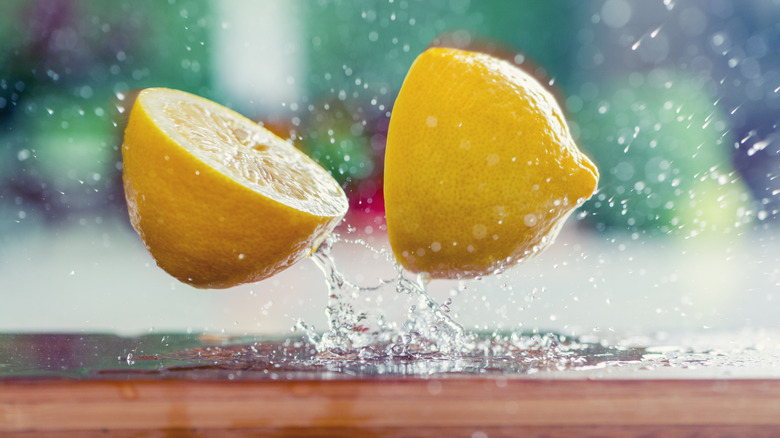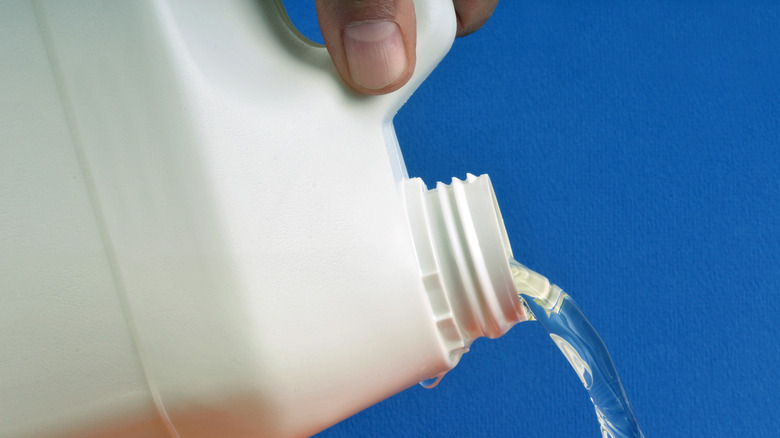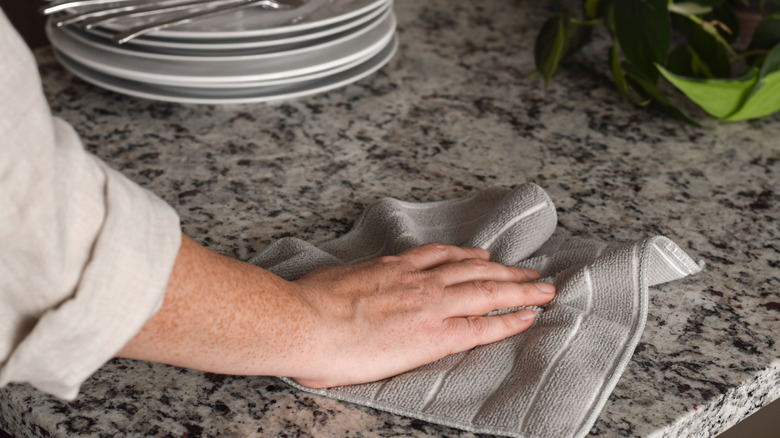The Cleaning Ingredients That Will Damage Granite Countertops
Granite is a popular countertop option in kitchens, bathrooms, and bar areas. This is a durable igneous stone, which is formed during the process of magma that eventually cools down and crystallizes. Its subsequent hardiness makes it a particularly sought-after building stone. Not only can you choose from a variety of colors, but granite also boosts the aesthetic quality of the given space in which you install it.
Despite its durability, granite can be susceptible to damage from everyday items and wear and tear, particularly if the stone isn't sealed. This includes accidental spills, abrasive materials, and even dropping heavy items on top of your counters. Unfortunately, some of the biggest mistakes with granite countertops involve cleaning. While you want to make sure you take care of your investment by keeping it clean, most natural and commercial cleaning products are unsafe to use on the material. Much of this has to do with the porous nature of granite, which can make it vulnerable to weakening, stains, and damage.
Glass cleaners can weaken granite and damage it over time
Glass cleaners are sometimes used as all-purpose cleaners, especially if you're short on time and want to clean up a mess rather quickly. However, you should think twice before spraying this product on granite countertops. These contain ammonium hydroxide, a known cleaning agent that can damage granite in kitchens and bathrooms.
While seemingly innocuous, glass cleaners like Windex can damage granite countertops in a couple of ways. First, glass cleaners can dull granite after use. This may seem ironic, given the fact that Windex removes streaks from glass. Even worse, glass cleaners can impair the sealant on your granite, leaving the rock underneath it vulnerable to cracks and stains. While glass cleaners may not necessarily damage perfectly sealed granite countertops after one-time use, it's best to skip this ingredient altogether. It's simply not worth the risk of damaging these expensive countertops.
Vinegar comprises an acid that can wear down granite
While you might use white vinegar as a cleaning ingredient over commercial products, this is one natural agent you need to keep away from granite countertops. According to the National Sanitation Foundation (NSF), white vinegar naturally contains 5% acetic acid, which can help eliminate oil, dirt, and bacteria on a variety of surfaces. At the same time, the NSF does not recommend using vinegar on natural stones (including granite), aluminum, and waxed wood.
Vinegar is advocated as an environmentally and budget-friendly cleaning ingredient, but it can do irreversible damage to granite. Like glass cleaners, vinegar can quickly damage the stone's sealant. Furthermore, it can leave small scratches on the surface and cause the stone to lose its shine. As such, it's best to skip using vinegar to clean granite countertops. Additionally, if you're using any type of vinegar for other purposes, take care when pouring it around granite and immediately clean all spills with soap and water to protect your countertops.
Steer clear of lemon and lemon juice
Like vinegar, lemon is acidic and can be used to create chemical-free cleaners. This property may be good for breaking down dirt and grime on a variety of surfaces. In fact, there are many household uses of lemon juice, including rust and grime removal, lifting stains from fabrics, and more. Despite its multipurpose qualities, lemon juice should never be used for cleaning granite.
Lemon juice, sodas, and other acidic products can easily wear down granite countertops, eventually leaving the stone susceptible to permanent damage. Another problem with lemon juice is that it corrodes the calcite (a naturally occurring calcium carbonate) in the stone. This can create a permanent white stain, especially if left to dry. Not only does this ruin the aesthetic appeal of your countertops, but it can also damage the sealant and make the granite more susceptible to cracks. Also, it's important to know that even a perfectly sealed granite countertop is not immune to the negative impacts of lemon.
Bleach and similar disinfectants are too harsh for granite
When it comes to killing germs, your first impulse may be to reach for bleach or another type of disinfecting product. You may be especially tempted to do so in the kitchen, particularly in the food preparation areas. The occasional use of bleach may not harm a brand-new granite countertop or one that has been recently sealed. However, cleaning with bleach and using similar products on granite is not worth the damage they cause in the long run.
Bleach and disinfectants can impair granite countertops by weakening their sealant. Once this happens, the stone is susceptible to permanent stains from spills, as well as chips and cracks. This is even more true if you use these types of products regularly or on a daily basis. Rather than taking the risk of damaging your granite, it's best to avoid bleach or other commercial disinfecting products altogether. The same rule applies to granite countertops in bathroom areas.
What to use for cleaning granite instead
Granite is considered an upscale countertop material, so you may be surprised to learn you don't need anything fancy to clean it. In fact, all you need to clean granite is plain dish soap, warm water, and a soft cloth. Experts recommend wiping down surfaces using "S" hand movements, starting from the back of the counter and toward the front. You can also buy commercial spray-on granite cleaners but know that these are not necessary.
On top of regular cleanings with soap and water, you have some options for disinfecting without resorting to bleach or other harsh products that can damage your countertops. Use hot water with soap or a 50:50 ratio of water to rubbing alcohol. Also, while you can scrub any caked-on food or debris with a soft sponge, avoid anything abrasive, as these can damage your granite countertops, too.
